-
 Bitcoin
Bitcoin $107,758.1435
-1.45% -
 Ethereum
Ethereum $2,490.6114
-3.32% -
 Tether USDt
Tether USDt $1.0004
0.00% -
 XRP
XRP $2.2042
-2.04% -
 BNB
BNB $651.4818
-1.12% -
 Solana
Solana $145.8782
-3.02% -
 USDC
USDC $0.9999
0.00% -
 TRON
TRON $0.2819
-1.39% -
 Dogecoin
Dogecoin $0.1621
-4.58% -
 Cardano
Cardano $0.5658
-4.18% -
 Hyperliquid
Hyperliquid $37.8181
-6.63% -
 Sui
Sui $2.8404
-4.91% -
 Bitcoin Cash
Bitcoin Cash $481.3703
-2.30% -
 Chainlink
Chainlink $13.0043
-4.79% -
 UNUS SED LEO
UNUS SED LEO $9.0464
0.26% -
 Avalanche
Avalanche $17.6115
-4.39% -
 Stellar
Stellar $0.2359
-2.11% -
 Toncoin
Toncoin $2.7507
-3.93% -
 Shiba Inu
Shiba Inu $0.0...01126
-4.41% -
 Litecoin
Litecoin $86.1256
-3.27% -
 Hedera
Hedera $0.1530
-3.13% -
 Monero
Monero $312.7785
-2.81% -
 Dai
Dai $1.0000
-0.01% -
 Ethena USDe
Ethena USDe $1.0001
-0.02% -
 Polkadot
Polkadot $3.3287
-5.55% -
 Bitget Token
Bitget Token $4.3840
-4.00% -
 Uniswap
Uniswap $6.8370
-10.63% -
 Pepe
Pepe $0.0...09548
-4.25% -
 Aave
Aave $260.2526
-6.11% -
 Pi
Pi $0.4658
-5.45%
How to choose Jupiter(JUP) exchange? Which platform has better liquidity?
Choose the right exchange for Jupiter (JUP) tokens by considering liquidity, user interface, fees, and security to maximize your trading experience and potential profits.
May 01, 2025 at 05:56 pm
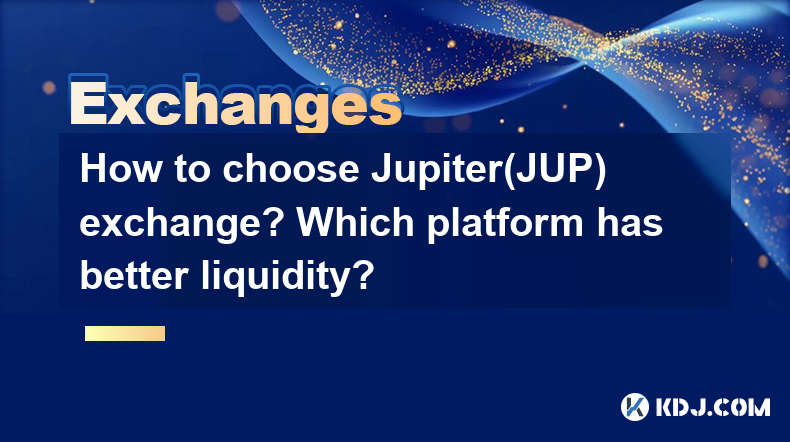
Choosing the right exchange for trading Jupiter (JUP) tokens is crucial for maximizing your trading experience and potential profits. Jupiter is a decentralized exchange (DEX) aggregator on the Solana blockchain, designed to provide users with the best possible trade routes across multiple DEXs. When selecting a platform for Jupiter, several factors need to be considered, including liquidity, user interface, fees, and security. This article will guide you through the process of choosing the best exchange for Jupiter and help you understand which platforms offer better liquidity.
Understanding Jupiter (JUP) Exchange
Jupiter (JUP) is a DEX aggregator that aims to streamline the trading process on the Solana blockchain. It scans various DEXs to find the most efficient trade routes, ensuring users get the best prices for their trades. Jupiter's main goal is to provide a seamless and cost-effective trading experience by minimizing slippage and optimizing trade execution.
When choosing an exchange for Jupiter, it's important to consider the following key factors:
- Liquidity: The ability to buy or sell assets quickly without causing a significant price change.
- User Interface: How easy it is to navigate and use the platform.
- Fees: The costs associated with trading, including transaction fees and slippage.
- Security: The measures in place to protect your assets and personal information.
Evaluating Liquidity on Jupiter (JUP) Platforms
Liquidity is a critical factor when choosing an exchange for Jupiter tokens. High liquidity ensures that you can execute trades quickly and at the best possible prices. To assess the liquidity of a platform, you can look at the following metrics:
- Trading Volume: The total amount of assets traded on the platform within a specific period.
- Order Book Depth: The number of buy and sell orders at different price levels.
- Slippage: The difference between the expected price of a trade and the price at which the trade is executed.
Some of the most popular platforms for trading Jupiter include Orca, Raydium, and Serum. Each of these platforms has its own strengths and weaknesses in terms of liquidity.
- Orca: Known for its user-friendly interface and high liquidity, Orca is a popular choice for trading Jupiter tokens. It offers competitive fees and a robust order book.
- Raydium: Raydium is another well-known DEX on the Solana blockchain, offering high liquidity and a wide range of trading pairs. It is particularly favored for its liquidity pools and automated market maker (AMM) system.
- Serum: As a decentralized exchange, Serum provides high liquidity and fast trade execution. It is known for its low fees and deep order book, making it an attractive option for Jupiter traders.
Comparing User Interfaces for Jupiter (JUP)
The user interface of an exchange can significantly impact your trading experience. A well-designed interface should be intuitive and easy to navigate, allowing you to execute trades quickly and efficiently.
- Orca: Orca's user interface is sleek and modern, with a focus on simplicity. It offers a straightforward trading experience, making it suitable for both beginners and experienced traders.
- Raydium: Raydium's interface is more complex, with a variety of features and options. While it may take some time to get used to, it offers advanced trading tools and a comprehensive dashboard.
- Serum: Serum's interface is clean and efficient, with a focus on speed and performance. It is designed for traders who prioritize quick trade execution and low fees.
Analyzing Fees on Jupiter (JUP) Platforms
Fees are another important consideration when choosing an exchange for Jupiter tokens. High fees can eat into your profits, so it's essential to choose a platform with competitive rates.
- Orca: Orca charges a fee of 0.3% per trade, which is competitive within the Solana ecosystem. It also offers liquidity provider (LP) rewards, allowing users to earn additional income.
- Raydium: Raydium's fees vary depending on the trading pair, but they typically range from 0.25% to 0.3%. Raydium also offers LP rewards and staking options.
- Serum: Serum's fees are among the lowest in the industry, with a standard fee of 0.22% per trade. It also provides liquidity incentives and staking rewards.
Assessing Security on Jupiter (JUP) Exchanges
Security is paramount when trading cryptocurrencies, as you want to ensure that your assets are protected from hacks and fraud. Each platform has its own security measures in place, which you should carefully evaluate.
- Orca: Orca uses smart contract audits and multi-signature wallets to enhance security. It also employs regular security updates and patches to address potential vulnerabilities.
- Raydium: Raydium prioritizes security through smart contract audits, penetration testing, and a bug bounty program. It also uses decentralized governance to ensure transparency and accountability.
- Serum: Serum's security measures include smart contract audits, multi-signature wallets, and a decentralized governance model. It also offers insurance funds to protect users from potential losses.
How to Choose the Right Exchange for Jupiter (JUP)
To choose the right exchange for Jupiter tokens, follow these steps:
- Research: Start by researching the available platforms and comparing their features, fees, and security measures. Look for user reviews and ratings to get a sense of their reputation.
- Evaluate Liquidity: Check the trading volume and order book depth of each platform to determine which one offers the best liquidity for Jupiter tokens.
- Test the Interface: Try out the user interface of each platform to see which one feels most comfortable and intuitive for you.
- Consider Fees: Calculate the potential fees for your trading strategy and choose a platform with competitive rates.
- Assess Security: Review the security measures of each platform and choose one that prioritizes the protection of your assets.
Frequently Asked Questions
Q: Can I trade Jupiter (JUP) tokens on centralized exchanges?
A: Currently, Jupiter (JUP) tokens are primarily traded on decentralized exchanges (DEXs) within the Solana ecosystem. Centralized exchanges may not support Jupiter tokens due to their focus on decentralized trading.
Q: How can I improve my trading experience on Jupiter (JUP) platforms?
A: To improve your trading experience, consider using limit orders to control your entry and exit points, staying informed about market trends and news, and utilizing liquidity pools to earn additional income.
Q: Are there any risks associated with trading Jupiter (JUP) tokens?
A: Yes, trading Jupiter tokens, like any cryptocurrency, comes with risks such as market volatility, smart contract vulnerabilities, and liquidity risks. It's important to conduct thorough research and only invest what you can afford to lose.
Q: Can I use Jupiter (JUP) tokens for purposes other than trading?
A: Yes, Jupiter tokens can be used for governance within the Jupiter ecosystem, allowing token holders to vote on proposals and participate in the development of the platform.
Disclaimer:info@kdj.com
The information provided is not trading advice. kdj.com does not assume any responsibility for any investments made based on the information provided in this article. Cryptocurrencies are highly volatile and it is highly recommended that you invest with caution after thorough research!
If you believe that the content used on this website infringes your copyright, please contact us immediately (info@kdj.com) and we will delete it promptly.
- Bitcoin's Pattern Break: Are HODLers the Key to the Next Surge?
- 2025-07-04 18:50:12
- Bitcoin Price, Trump's Bill, and the $150K Dream: A NYC Take
- 2025-07-04 19:50:12
- Ethereum, LILPEPE, and the July Bounce: Will Pepe Steal ETH's Thunder?
- 2025-07-04 19:10:12
- Binance Institutional Loans: Unlocking 4x Leverage and Zero Interest for Whales
- 2025-07-04 19:15:12
- Bitcoin Bull Run: Analysts Eye Peak in Late 2025?
- 2025-07-04 19:20:13
- Pepe Indicators, Bullish Forecast: Can the Meme Coin Rally?
- 2025-07-04 19:25:12
Related knowledge
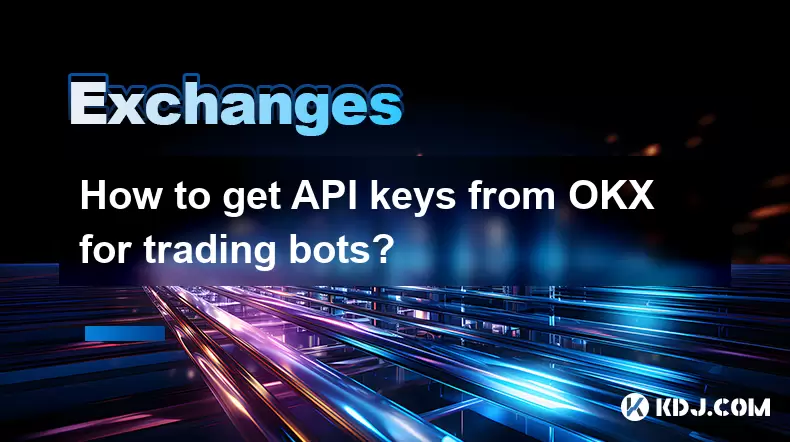
How to get API keys from OKX for trading bots?
Jul 03,2025 at 07:07am
Understanding API Keys on OKXTo interact with the OKX exchange programmatically, especially for building or running trading bots, you need to obtain an API key. An API (Application Programming Interface) key acts as a secure token that allows your bot to communicate with the exchange's servers. On OKX, these keys come with customizable permissions such ...
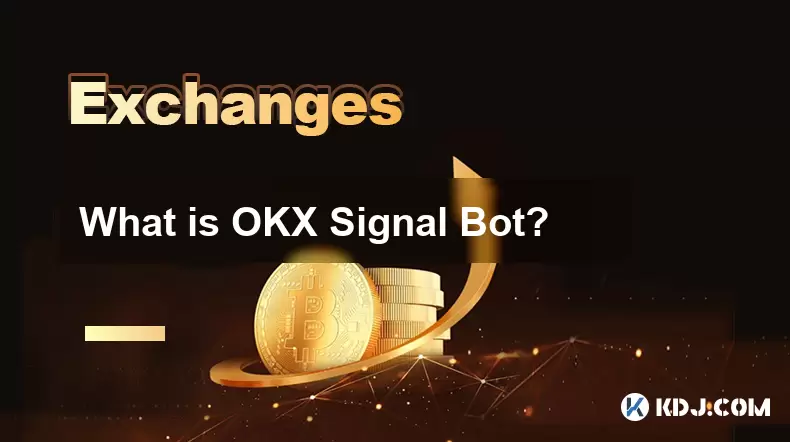
What is OKX Signal Bot?
Jul 02,2025 at 11:01pm
Understanding the Basics of OKX Signal BotThe OKX Signal Bot is a feature within the OKX ecosystem that provides users with automated trading signals and execution capabilities. Designed for both novice and experienced traders, this bot helps identify potential trading opportunities by analyzing market trends, technical indicators, and historical data. ...
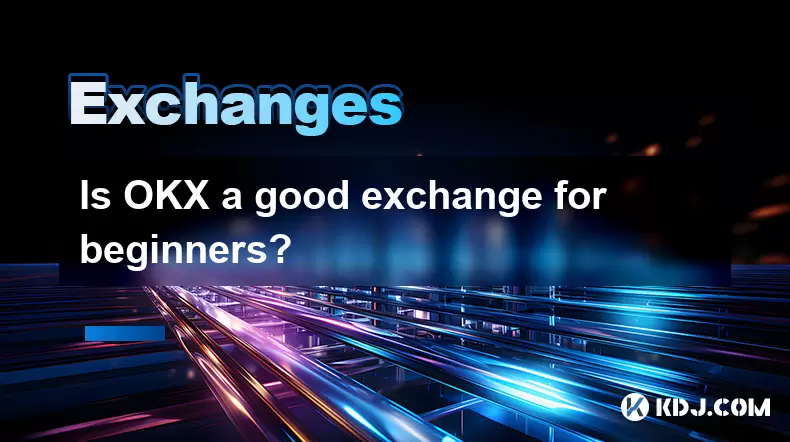
Is OKX a good exchange for beginners?
Jul 03,2025 at 05:00pm
What Is OKX and Why Is It Popular?OKX is one of the leading cryptocurrency exchanges globally, known for its robust trading infrastructure and a wide variety of digital assets available for trading. It supports over 300 cryptocurrencies, including major ones like Bitcoin (BTC), Ethereum (ETH), and Solana (SOL). The platform has gained popularity not onl...
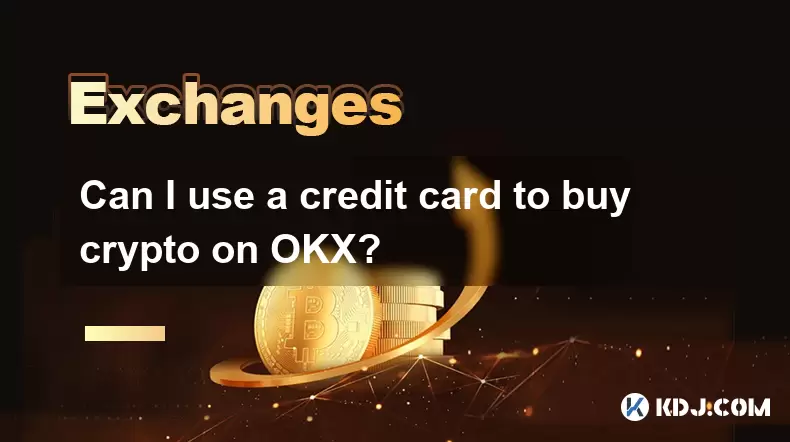
Can I use a credit card to buy crypto on OKX?
Jul 04,2025 at 04:28am
Understanding OKX and Credit Card PaymentsOKX is one of the leading cryptocurrency exchanges globally, offering a wide range of services including spot trading, derivatives, staking, and more. Users often wonder whether they can use a credit card to buy crypto on OKX, especially if they are new to the platform or looking for quick ways to enter the mark...
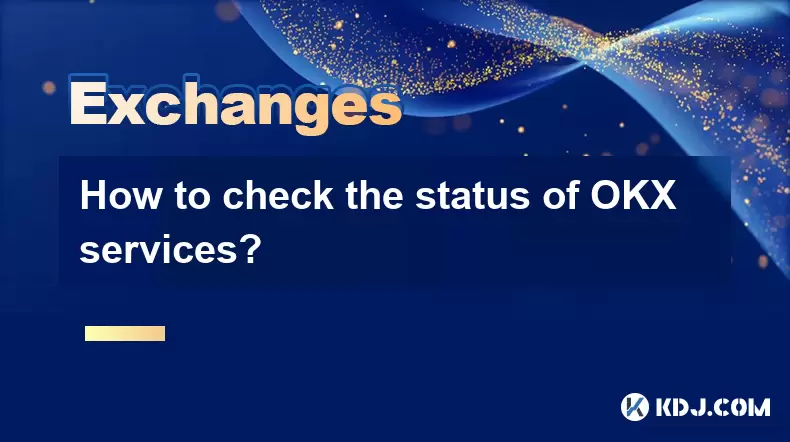
How to check the status of OKX services?
Jul 02,2025 at 11:14pm
What is OKX, and Why Checking Service Status Matters?OKX is one of the world’s leading cryptocurrency exchanges, offering services such as spot trading, futures trading, staking, and more. With millions of users relying on its platform for daily transactions, it's crucial to know how to check the status of OKX services. Downtime or maintenance can affec...
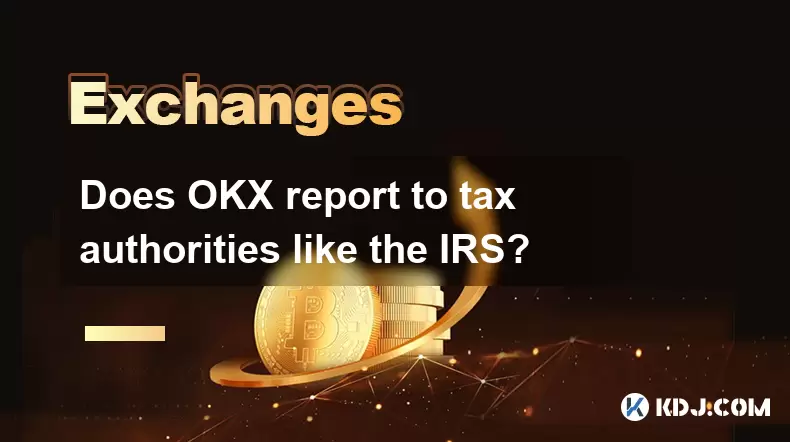
Does OKX report to tax authorities like the IRS?
Jul 03,2025 at 03:14pm
Understanding the Role of Cryptocurrency Exchanges in Tax ReportingCryptocurrency exchanges play a crucial role in facilitating digital asset transactions, but their responsibilities extend beyond trading and custody. As regulatory scrutiny intensifies globally, users are increasingly concerned about whether platforms like OKX report to tax authorities ...

How to get API keys from OKX for trading bots?
Jul 03,2025 at 07:07am
Understanding API Keys on OKXTo interact with the OKX exchange programmatically, especially for building or running trading bots, you need to obtain an API key. An API (Application Programming Interface) key acts as a secure token that allows your bot to communicate with the exchange's servers. On OKX, these keys come with customizable permissions such ...

What is OKX Signal Bot?
Jul 02,2025 at 11:01pm
Understanding the Basics of OKX Signal BotThe OKX Signal Bot is a feature within the OKX ecosystem that provides users with automated trading signals and execution capabilities. Designed for both novice and experienced traders, this bot helps identify potential trading opportunities by analyzing market trends, technical indicators, and historical data. ...

Is OKX a good exchange for beginners?
Jul 03,2025 at 05:00pm
What Is OKX and Why Is It Popular?OKX is one of the leading cryptocurrency exchanges globally, known for its robust trading infrastructure and a wide variety of digital assets available for trading. It supports over 300 cryptocurrencies, including major ones like Bitcoin (BTC), Ethereum (ETH), and Solana (SOL). The platform has gained popularity not onl...

Can I use a credit card to buy crypto on OKX?
Jul 04,2025 at 04:28am
Understanding OKX and Credit Card PaymentsOKX is one of the leading cryptocurrency exchanges globally, offering a wide range of services including spot trading, derivatives, staking, and more. Users often wonder whether they can use a credit card to buy crypto on OKX, especially if they are new to the platform or looking for quick ways to enter the mark...

How to check the status of OKX services?
Jul 02,2025 at 11:14pm
What is OKX, and Why Checking Service Status Matters?OKX is one of the world’s leading cryptocurrency exchanges, offering services such as spot trading, futures trading, staking, and more. With millions of users relying on its platform for daily transactions, it's crucial to know how to check the status of OKX services. Downtime or maintenance can affec...

Does OKX report to tax authorities like the IRS?
Jul 03,2025 at 03:14pm
Understanding the Role of Cryptocurrency Exchanges in Tax ReportingCryptocurrency exchanges play a crucial role in facilitating digital asset transactions, but their responsibilities extend beyond trading and custody. As regulatory scrutiny intensifies globally, users are increasingly concerned about whether platforms like OKX report to tax authorities ...
See all articles

























































































